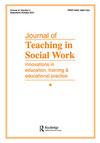Enhancing MSW Field Education Using Rapid Cycle Quality Improvement: Feasibility and Acceptability of an Online Weekly Feedback Tool and Process
IF 0.9
Q3 EDUCATION & EDUCATIONAL RESEARCH
引用次数: 1
Abstract
ABSTRACT Rapid Cycle Quality Improvement (RCQI) is often required for behavioral health work force training and evaluation projects supported by the U.S. Health Resources and Services Administration (HRSA). The RCQI process is well established within healthcare but under-utilized in academia to improve teaching and learning. We created and piloted the Friday Feedback (FF) survey tool as part of a HRSA funded training program for weekly completion by MSW interns. Across two semesters of full-time field education, a cohort of 15 MSW students completed 281 weekly FF surveys. Students reported activities such as number of patients seen, observations about integration of behavioral and physical health, patient successes and challenges, and time spent working on interdisciplinary teams. Cumulatively, students reported working with 2,425 patients/clients and in frequent close collaboration with other health professions. A review team comprised of faculty and staff met weekly to discuss students’ FF data and create response plans to promote student learning. The RCQI process was feasible and acceptable to students and the team. It created a feedback loop to improve students’ field experiences, enhanced the curriculum, and enabled effective monitoring and rapid response from team to students. Benefits and challenges of this RCQI approach to enhance field education along with lessons learned for wider adoption are discussed.利用快速循环质量改进加强城市生活垃圾现场教育:每周在线反馈工具和流程的可行性和可接受性
摘要美国卫生资源与服务管理局(HRSA)支持的行为健康工作人员培训和评估项目通常需要快速循环质量改进(RCQI)。RCQI过程在医疗保健领域已经建立起来,但在学术界用于改善教学的情况却很少。我们创建并试行了周五反馈(FF)调查工具,作为HRSA资助的MSW实习生每周完成的培训计划的一部分。在为期两个学期的全日制实地教育中,15名MSW学生完成了281项每周FF调查。学生们报告了一些活动,如就诊患者的数量、对行为和身体健康整合的观察、患者的成功和挑战,以及在跨学科团队中工作的时间。学生们报告称,他们与2425名患者/客户合作,并经常与其他卫生专业人员密切合作。由教职员工组成的审查小组每周开会讨论学生的FF数据,并制定应对计划以促进学生学习。RCQI过程是可行的,学生和团队都能接受。它创建了一个反馈回路,以改善学生的实地体验,改进课程,并实现团队对学生的有效监控和快速反应。讨论了这种RCQI方法在加强实地教育方面的好处和挑战,以及为更广泛采用而吸取的经验教训。
本文章由计算机程序翻译,如有差异,请以英文原文为准。
求助全文
约1分钟内获得全文
求助全文
来源期刊

Journal of Teaching in Social Work
EDUCATION & EDUCATIONAL RESEARCH-
CiteScore
1.20
自引率
0.00%
发文量
36
期刊介绍:
The Journal of Teaching in Social Work fills a long-standing gap in the social work literature by providing opportunities for creative and able teachers—in schools, agency-based training programs, and direct practice—to share with their colleagues what experience and systematic study has taught them about successful teaching. Through articles focusing on the teacher, the teaching process, and new contexts of teaching, the journal is an essential forum for teaching and learning processes and the factors affecting their quality. The journal recognizes that all social work practitioners who wish to teach (whatever their specialty) should know the philosophies of teaching and learning as well as educational methods and techniques.
 求助内容:
求助内容: 应助结果提醒方式:
应助结果提醒方式:


